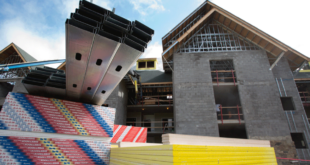While the healthy level of activity across Canada appears to be something many retailers shared through most of the country, it may not be enough to put most retailers ahead in sales over last year.
Central and Eastern Canada
In central Canada, where things aren’t quite as buoyant, many retailers finished the first quarter down by as much as 15 percent, says Dave Campbell, president of the Lumber and Building Materials Association of Ontario. He says the consensus among his retailers is if the year stays strong enough for them to meet last year’s numbers, most of them would be happy. “It’s a soft year,” he says. “Some of it’s the weather; some of it’s the economy.”
Down east, conditions may be even more moderate, not including Newfoundland, which is “still going strong,” says Don Sherwood, president of the Atlantic Building Supply Dealers Association. “The potential there remains good.” That’s not the case elsewhere in the Maritime provinces of New Brunswick, Nova Scotia and Prince Edward Island. “This year, flat is good,” he says, “but most of the groups are saying, ‘We haven’t seen the good yet.’ A large number of them are not getting there.”
However, he remains optimistic that his retailers’ year-over-year sales will be able to catch up through 2013, given the last half of 2012 was soft through most of the Maritime provinces.
Western Canada
Meanwhile, the greatest strength still appears to be out West. Gary Hamilton, president of the Western Retail Lumber Association, says weather is returning to normal after the severe flooding in Alberta, despite pockets such as High River, which remain devastated. “But overall, it’s very good, helped further by the migration back into Manitoba and Saskatchewan.”
Yet even with the strong level of building activity in cities like Winnipeg, Hamilton remains “cautiously optimistic,” echoing the sentiments of his colleagues across the country. “There are no great records being broken out there; just solid, steady business.”
Quebec
While western Canada and Newfoundland remain relatively strong, retailers in other parts of Canada are working hard through the summer to try to make up their year.
Quebec is no exception. Richard Darveau, president of Quebec’s home improvement industry association, AQMAT, is blunt in his assessment: “Quebec is doing badly.”
He blames a combination of factors that made the spring and early summer what he calls “the worst in a decade.” Unrelenting rains in the spring were followed by a hot, dry spell. Second, the mood of people in the province has been dampened by the ongoing revelations of corruption and payoffs within the municipal governments of cities like Montreal and Laval. Third, a protracted construction strike couldn’t come at a worse time, Darveau says. “This conflict in the industry literally paralyzed the business in the residential sector at a time of the year when it is normally at its peak.”
Darveau doesn’t expect retailers to make it up easily in the last half of the year. “What is lost will stay lost. But we are optimistic for the fall.” He says these business challenges can be put in perspective in light of a train disaster in Lac-Mégantic that took the lives of almost 50 people and devastated the town.
British Columbia
With the benefit of some “fairly strong activity in 2012” to propel it, the market in British Columbia is enjoying good sales this summer, says Thomas Foreman, president of the Building Supply Industry Association of B.C.
In fact, after a slow start to the year that was typical of most of the country, “We’ve had four weeks of unprecedented good weather and sunshine, which is overall making up for the earlier spring months of heavy rain,” he says. Retailers are seeing their staff hustle as customers begin to accelerate projects.
“People are painting, roofing, paving—doing all the things they don’t usually get to do when it rains.”
For the year, Foreman expects some continued positive growth—tempered by forecasts of a slower housing market. He notes factors such as the provincial election earlier this year have brought some stability to the province.
Story provided by Hardlines newsletter.
 Hardware Retailing The Industry's Source for Insights and Information
Hardware Retailing The Industry's Source for Insights and Information








